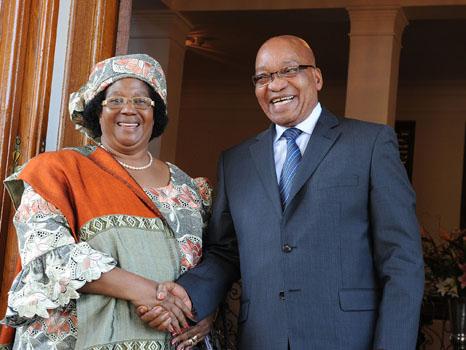Malawi: Banda brings Malawi back from the brink – By Keith Somerville


Joyce Banda meets South African President Zuma in an effort of strengthen regional relations weakened under Mutharika.
When Joyce Banda was sworn in as president on 7th April, following the death of President Bingu wa Mutharika, she was faced with an uphill struggle. Her constitutionally-ordained succession had been briefly resisted by several members of Mutharika’s cabinet and she had to establish her authority and move quickly to put right policies that had moved the country back towards autocracy, muzzled the press, alienated key donors and damaged the economy. Since taking charge she’s made clear who’s boss while building bridges politically and working to bring on board civil society groups and bridge the gap that had opened between Malawi, donors and financial institutions. Addressing parliament on 18 May, for the first time as president, she said the immediate restoration of the rule of law and donor confidence will be crucial to the country’s economic recovery. Banda added that it would take a year to bring back the economy, struggling with fuel, power and water shortages, back on track.
Her first move was to sack the unpopular police commander, Peter Mukhito, and appoint a successor, Loti Dzonzi, who is more acceptable to her supporters, civil society groups and to ordinary Malawians (African Arguments, 10 April 2012). She followed this up with a cabinet reshuffle. Banda sacked the foreign minister and brother of the late president, Peter Mutharika, not a surprise given his role in the attempt to prevent her succession. Several other Mutharika loyalists were fired to make way for some surprises appointees, notably the son of former President Bakili Muluzi, Austin Atupele Muluzi, who entered cabinet as the economic planning and development minister. Muluzi is a member of United Democratic Front (UDF) and is said to have presidential ambitions. Prior to the death of Mutharika he had drawn large crowds at UDF rallies and was arrested by the police accused of inciting violence after political unrest in Lilongwe in July 2011.
Another former detainee, lawyer and civil rights activist Ralph Kasambara, was named justice minister and attorney general – a post he had held when Bingo wa Mr Mutharika first came to power in 2004. Ephraim Chiume was appointed to the Foreign Affairs and International Cooperation portfolio, while former finance minister Ken Kandodo, a grand-nephew of Malawi’s founder Kamuzu Banda, was appointed minister of defence. Another interesting decision was the inclusion of former vice president Cassim Chilumpha, accused by the late president of plotting to assassinate him and still involved in a treason trial, as minister of energy and mining. The president has put herself in charge of the civil service, disaster management, nutrition, HIV and AIDS. She is also commander in chief of the Malawi Defence Force and the 8,000 strong Malawi police service. Khumbo Kachali, expelled from the DPP by Mutharika, was appointed first vice-president.
To govern effectively, Joyce Banda had to garner sufficient support in parliament. Her party, the People’s Party (PP) had few MPs and isn’t officially recognized within parliament, not having existed when parliament was elected in 2009, since her inauguration, everyone seems to want to gate-crash the party. More than 80 former members of Mutharika’s Democratic Progressive Party (DPP) and 98 UDF members (including a number of MPs) have applied to join. There have been relatively few defectors from the opposition Malawi Congress Party (MCP) though there are persistent rumours that the former right-hand man of the dictatorial Kamuzu Banda (ruler from 1964 to 1994) John Z U Tembo might join if he is offered the post of Second Vice-President. Tembo, once feared as Kamuzu’s hatchet man, has offered the support of his party to the new President Banda. Whether or not he is appointed, he clearly intends to back Banda for the time being, having said recently that “the People’s Party policies and those of Malawi Congress Party are similar. Her Excellency, when she was vice-president, stood with us in opposition when we faced challenges against the then regime; therefore, I am reiterating my support to the government of the People’s Party”.
With so many people changing party to line up with the new president, it remains to be seen whether disgruntled DPP members will ask the Speaker of parliament to invoke Section 65 of the constitution, which would declare vacant the parliamentary seats of those who leave the party they were elected to represent. But for Joyce Banda what matters is not the official party designation of MPs within parliament, but their votes when she needs legislation passed.
As Banda goes about political alliance-building, she needs to keep on the right side of civil society groups and the press. Mutharika was effectively at war with civil society, human rights groups and the media. He had grown increasingly autocratic and sensitive to criticism in his final years. He had openly called on DPP party militants to beat critics and had taken a tough line with the press. The late president had launched an offensive against the increasingly independent media. Angry at increasing press criticism, Mutharika amended Section 46 of the Penal Code in February 2011, limiting the freedom of the press. The amendment gave the information minister powers to prohibit the publication or importing of any publication which was deemed against the public or national interest. This was a step backwards in media freedom and contradicted the 1995 constitution, which enshrined freedom of the press. The new law and the growing harassment of journalists by Mutharika’s party and the police resulted in Malawi falling 67 places in the Reporters without Borders Press Freedom Index for 2011-12 ; down to 146 out of 179.
Civil society groups and media associations are waiting to see if Joyce Banda will meet their expectations that she will be more liberal and will move quickly to repeal the media law amendment, signalling a freedom for the media. The chair of the Malawian section of the Media Institute of Southern Africa, Anthony Kisunda, has expressed concern that some senior DPP politicians who had openly threatened journalists and the freedom of the press were now part of the new government or had declared their support for it.
In the field of foreign policy, Banda has signalled a change in policy that is intended to mend fences with foreign donors and clean up Malawi’s international image. In early May, she called openly on President al-Bashir of Sudan not to attend an African Union summit in Malawi later in the year. Bashir has been indicted for crimes against humanity and Malawi was criticized when Mutharika welcomed Bashir in Malawi in October 2011. The AU is not happy about this Malawian stance and does not support her view, but it has won her brownie points in the west. In mid-May, she announced that she wanted to move to repeal laws that banned homosexuality. A number of Western leaders have recently said they would cut aid to countries which did not recognise gay rights, so this move by Banda could help Malawi’s general standing among donors.
Crucially, Banda is improving relations with key donors, who supply 40 percent of Malawi’s budgetary income. Britain, Germany, the United States and the African Development Bank all froze or cut aid to Malawi under Mutharika over his human rights policies or his obstructive approach in dealings with the IMF and World Bank. Britain cut aid after Mutharika kicked out the British High Commissioner over leaked comments criticizing the Malawian president’s increasingly authoritarian behaviour. In late April, it was announced that President Banda had appointed former diplomat Benard Sande as the new High Commissioner to London, with John Tembo Junior – son of John Z U Tembo of the MCP – as his deputy. The president said that the British Prime Minister, David Cameron, had indicated that he would appoint a High Commissioner to Malawi, ending the row and preparing the way for the resumption of British aid and budget support. This was confirmed when foreign secretary William Hague stated that London had restored full diplomatic relations with Malawi. Britain is the main bilateral donor and its aid in 2011 was due to amount to £90m before the break in relations – £19m in budgetary support was immediately frozen. Under the previous president, the German government halved its budgetary support and the US government’s Millennium Challenge Corporation withheld a $350m grant to rehabilitate Malawi’s crumbling energy network.
A sign that donors were ready to give Banda help came in late April when the head of the African Development Bank said he was willing to provide $45m in budget financing for Malawi to help new President Joyce Banda revive the struggling economy. ADB President Donald Kaberuka said he had held “good” discussions with Malawian Finance Minister Ken Lipenga on the sidelines of IMF meetings in Washington, adding, “I am confident Malawians are doing the right thing and we want to support them”. Another boost for Banda and the troubled Malawian economy was provided by South Africa’s decision to mark Banda’s first visit there as president by agreeing a loan of $35m to help Malawi import much-needed fuel. This loan is all the more important as the Reserve Bank of Malawi devalued the kwacha by 33 per cent in early May. This will have done much to convince the IMF of Banda’s seriousness about economic change and Banda will hope that it will unlock IMF and donor aid.
The IMF suspended a $79m aid facility for Malawi after serious disagreements with Bingu wa Mutharika. The Reserve Bank made clear its hopes for a positive reaction from the Fund saying that it should “contribute to government’s efforts to reach early agreement with the IMF which should leading to unlocking donor flows in the next few months”. One side effect, not appreciated by many Malawians, was a rise in prices of many commodities. Immediately after the devaluation, shoppers in Malawi were said to be scrambling to buy basic goods, fearing huge price rises. The BBC reported that many shops had run out of staple foods such as sugar, cooking oil and bread soon after the devaluation was announced. Some shops and traders were said to be increasing prices even before the actual cost of imports increased. Price rises and public discontent over them could be the major clouds on the horizon for the new government.
Keith Somerville lectures in Humanitarian Communications in the School of Politics and International Relations at the University of Kent, at Canterbury and runs the Africa – News and Analysis website www.africajournalismtheworld.com




